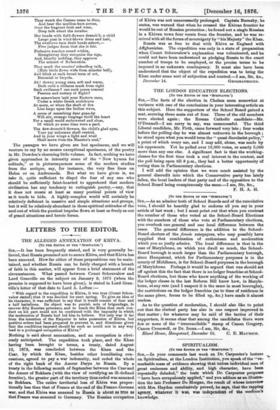LETTERS TO THE EDITOR.
THE ALLEGED ANNEXATION OF KHIVA.
[TO THE EDITOR OF THE .` SPECTATOR.")
Sin,—It has been frequently stated, and is very generally be- lieved, that Russia promised not to annex Khiva, and that Khiva has been annexed. How far either of these propositions can be main- tained, and whether Russia can be fairly charged with a breach of faith in this matter, will appear from a brief statement of the circumstances. What passed between Count Schouvalow and Lord Granville on the subject on January 8, 1873 (when the promise is supposed to have been given), is stated in Lord Gran- ville's letter of that date to Lord A. Loftus :—
" With regard to the expedition to Khiva, it was true (Count Schou- valow stated) that it was decided for next spring. To give an idea of its character, it was sufficient to say that it would consist of four and a half battalions. Its object was to punish acts of brigandage, to recover fifty Russian prisoners, and to teach the Khan that such con- duct on his part could not be continued with the impunity in which the moderation of Russia had led him to believe. Not only was it far from the intention of the Emperor to take possession of Khiva. but positive orders had been prepared to prevent it, and directions given that the conditions imposed should be such as could not in any way lead to a prolonged occupation of Khiva."
Nothing is said about annexation, and an occupation is obvi- ously anticipated. The expedition took place, and the Khan having been brought to terms, a treaty, dated August 12, 1873, was concluded between the Khan and the Czar, by which the Khan, besides other humiliating con- cessions, agreed to pay a war indemnity, and ceded the whole of the right bank of the Amour Darya ,to Russia. By a treaty in the following month of September between the Czar and the Ameer of Bokhara (with the view of rectifying an ill-defined frontier), the greater part of the territory thus ceded was annexed to Bokhara. The entire territorial loss of Khiva was propor- tionally less than that of France at the end of the Franco-German war, and that Khiva was annexed to Russia is about as true as that France was annexed to Germany. The Russian occupation
of Khiva was not unnecessarily prolonged. Captain Burnaby, he states, was warned that when he crossed the Khivan frontier he would be out of Russian protection ; he found not a single Russian in a Khivan town four versts from the frontier, and he was re- ceived with all the forms of sovereignty by" his Majesty " the Khan.
Russia was as free to deal with Khiva as England with Affghanistan. The expedition was only in a state of preparation when Count Schouvalow's explanation was volunteered, and he could not have been understood as pledging Russia to the exact number of troops to be employed, or the precise terms to be imposed in an unknown contingency. It must also have been understood that the object of the expedition was to bring the Khan under some sort of subjection and control.—I am, Sir, &c.,


































 Previous page
Previous page